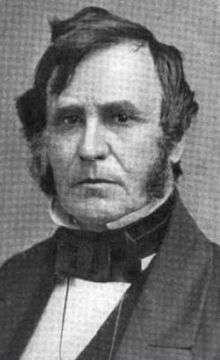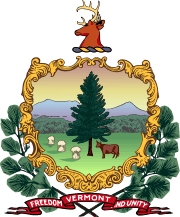Paul Dillingham
| Paul Dillingham Jr. | |
|---|---|
 Paul Dillingham, Governor of Vermont, 1865 to 1867 | |
| 29th Governor of Vermont | |
|
In office October 13, 1865 – October 13, 1867 | |
| Lieutenant | Abraham B. Gardner |
| Preceded by | J. Gregory Smith |
| Succeeded by | John B. Page |
| 23rd Lieutenant Governor of Vermont | |
|
In office 1862–1865 | |
| Governor | J. Gregory Smith |
| Preceded by | Levi Underwood |
| Succeeded by | Abraham B. Gardner |
| Member of the U.S. House of Representatives from Vermont's 1st district | |
|
In office March 4, 1843 – March 3, 1847 | |
| Preceded by | Augustus Young |
| Succeeded by | Lucius B. Peck |
| Member of the Vermont Senate | |
|
In office 1841–1842 1861 | |
| Member of the Vermont House of Representatives | |
|
In office 1833–1835 1837–1840 | |
| Personal details | |
| Born |
August 10, 1799 Shutesbury, Massachusetts |
| Died |
July 26, 1891 (aged 91) Waterbury, Vermont |
| Political party |
Democratic Republican |
| Spouse(s) |
Sarah Partridge Carpenter Dillingham Julia Carpenter Dillingham |
| Relations |
William Paul Dillingham (son) Matthew H. Carpenter (son in law) |
| Children |
William Paul Dillingham Frank Dillingham Caroline Dillingham Carpenter Edwin Dillingham |
| Profession |
Attorney Politician |
Paul Dillingham, Jr. (August 10, 1799 – July 26, 1891) was an American lawyer and politician. He served as a U.S. Representative from Vermont, the 23rd Lieutenant Governor of Vermont from 1862 to 1865, and the 29th Governor of Vermont in 1865 and 1866.
Biography
Born in Shutesbury, Massachusetts, Dillingham moved with his father to Waterbury, Vermont, in 1805. After attending the district school in Waterbury, he studied law and was admitted to the bar in March 1823. In April, he began his practice in Waterbury as a partner with Daniel Carpenter, which continued until Carpenter became a judge.[1] He married Sarah Partridge Carpenter, daughter of Daniel Carpenter. After Sarah's death on September 20, 1831, he married her sister, Julia. He had seven children.[2]
Career
Dillingham was a Justice of the Peace from 1826 to 1844, and Town Clerk of Waterbury from 1829 to 1844. He served as member of the Vermont House of Representatives from 1833 to 1835, as State's Attorney of Washington County from 1835 to 1838, and again as member of the Vermont House from 1837 to 1840. Dillingham served as a delegate to the State constitutional conventions of 1836 and 1857, in the Vermont State Senate in 1841, 1842, and 1861, and again as a delegate to the State constitutional convention in 1870.
Dillingham was elected as a Democrat to the Twenty-eighth and Twenty-ninth Congresses (March 4, 1843 – March 3, 1847).[3] He was not a candidate for renomination in 1846.
When the American Civil War started, Dillingham changed his allegiance from the Democratic Party to the Republican Party. As a Republican, Dillingham served as the 22nd Lieutenant Governor from 1862 to 1865, and as the 29th Governor of Vermont in 1865 and 1866. As Governor, he created Vermont's first reform school and established a state normal school for teacher training.[4] He resumed the practice of law until he retired in 1875.
Family
Paul Dillingham was the father of Vermont Governor and U.S. Senator William Paul Dillingham. He was also the father in law of U.S. Senator Matthew H. Carpenter. (Carpenter was married to Dillingham's daughter Caroline, nicknamed Cara).[5]
Death
Dillingham died at his home in Waterbury on July 26, 1891. He is interred in the Village Cemetery in Waterbury.[6]
References
- ↑ "Paul Dillingham". Ancestry.com. Retrieved 8 November 2012.
- ↑ "Paul Dillingham". National Governors Association. Retrieved 8 November 2012.
- ↑ "Paul Dillingham". Govtrack.com. Retrieved 8 November 2012.
- ↑ "Paul Dillingham". National Governors Association. Retrieved 8 November 2012.
- ↑ "Paul Dillingham". Find A Grave. Retrieved 8 November 2012.
- ↑ "Paul Dillingham". The Political Graveyard. Retrieved 8 November 2012.
External links
| Wikimedia Commons has media related to Paul Dillingham. |
- United States Congress. "Paul Dillingham (id: D000346)". Biographical Directory of the United States Congress.
- Biographical Directory of the United States Congress
- The Political Graveyard
- National Governors Association
- Find A Grave
| United States House of Representatives | ||
|---|---|---|
| Preceded by Augustus Young |
Member of the U.S. House of Representatives from Vermont's 4th congressional district 1843–1847 |
Succeeded by Lucius B. Peck |
| Political offices | ||
| Preceded by Levi Underwood |
Lieutenant Governor of Vermont 1862–1865 |
Succeeded by Abraham B. Gardner |
| Preceded by J. Gregory Smith |
Governor of Vermont 1865–1867 |
Succeeded by John B. Page |
![]() This article incorporates public domain material from the Biographical Directory of the United States Congress website http://bioguide.congress.gov.
This article incorporates public domain material from the Biographical Directory of the United States Congress website http://bioguide.congress.gov.
